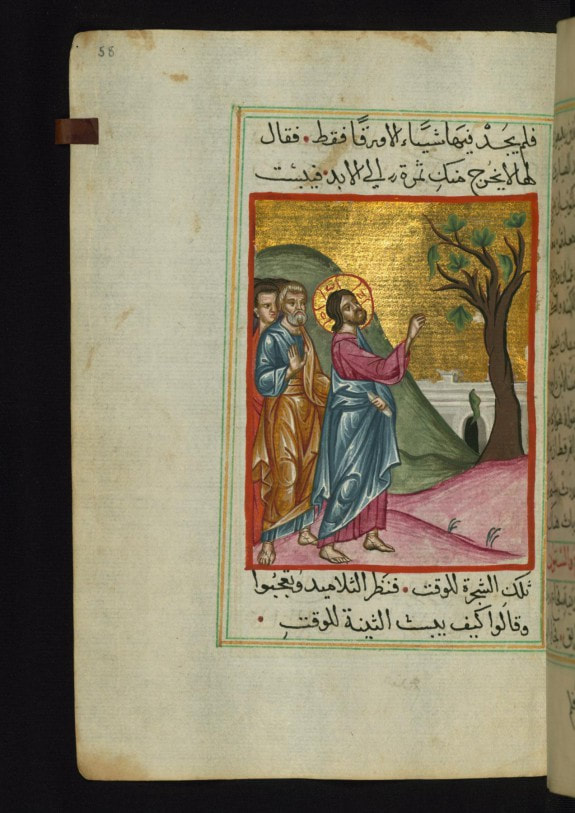The account begins the day following Jesus entering Jerusalem on what we call “Palm Sunday”, days before Jesus would be crucified. On the previous day he had visited the temple and saw everything going on at His Father’s (God’s) house. He saw the buying, selling and merchandising – the great sin of the priests who were profiting and taking advantage of pilgrims who were faithfully coming to celebrate Passover. After spending the night in Bethany it goes on to say:
The next day as they were leaving Bethany, Jesus was hungry. Seeing in the distance a fig tree in leaf, he went to find out if it had any fruit. When he reached it, he found nothing but leaves, because it was not the season for figs. Then he said to the tree, “May no one ever eat fruit from you again.” (Mark 11:12-14)
Later ‘that’ day the account goes on to say that he went to the temple and cast the money changers and merchandisers out, turning over their tables.
In the morning, as they went along, they saw the fig tree withered from the roots. Peter remembered and said to Jesus, “Rabbi, look! The fig tree you cursed has withered!”
“Have faith in God,” Jesus answered. (Mark 11:20-22)
Now it probably seems strange that Jesus cursed a tree just because he was hungry and was disappointed, but we’d be missing out on what Jesus was teaching His disciples if we didn’t look closer.
THE SIGNIFICANCE OF THE BREBA CROPDid you know that many fig trees bear more than just one crop? There is something we today call a ‘Breba’ crop, or an ‘out of season’ crop.
The Breba crop is produced on ‘a mature branch’ the previous year’s wood, unlike the main crop of figs that grow on the current year’s new, green wood. The Breba crop is small in number but often produces the very largest, sweet figs, a time when no other tree is anywhere close to ripening fruit.
You see, the leafy tree in the distance was holding out the promise of fruit (blessing… sustenance… life). People had gone all winter without fresh fruit and looked forward to these ‘Breba’ figs, so of course Jesus fully and rightfully expected that the tree would naturally have early fruit growing on ‘a mature branch’.
But there is always more to the story isn’t there?
Jesus was “expecting to find fruit” from the mature wood, and at a time when it was most desired in early spring (at about the time of Passover) and because it was expected and sent him away hungry, it was a tree holding out promise, but upon further investigation it was found lacking. It was a fig tree that didn’t provide what it was created to provide.
The Jewish leaders – the Priests, Rabbis, Pharisees, Sadducees, scribes and others were in fact, Israel’s ‘mature branches’.
CREATED TO BEAR GOOD FRUITWhen Jesus had entered Jerusalem the previous day, he was expecting to find the religious leaders feeding spiritual fruit to the hungry pilgrims, many of whom had come to the Passover celebration to find sustenance. They came to the temple expecting to be fed, but only found disappointment. The religious leaders who were ordained (created) to feed them the good things of God, presented themselves like early leaves; holding out the promise of fruit, but they were in fact fruitless. Instead of providing nourishment, they were taking advantage of the people and sending them away hungry – just as Jesus was left hungry by the fruitless fig tree.
Jesus was conveying both a prophetic and practical message to his disciples: If you are created to bear good fruit, but are rebellious and refuse to bear fruit, you will be cursed. His words were,
“May no one ever eat fruit from you again.” (Mark 11:14)
In 70 AD (less than a generation later) when the Jews rebelled against Rome, the temple was destroyed. The priests were expelled or killed, and the temple was set on fire to recover the gold adorning the temple and then taken apart block by block to recover that gold. In a somewhat related verse, Jesus spoke the following words:
“I am the vine; you are the branches. If you remain in me and I in you, you will bear much fruit; apart from me you can do nothing. If you do not remain in me, you are like a branch that is thrown away and withers; such branches are picked up, ‘thrown into the fire and burned’. (John 15:5-6)
Many people wander about in our world, hungry for the things of God. As we know, you and I were created and equipped to bear good fruit – both the early and hungrily anticipated ‘Breba’ crop and likewise the ‘main season’ sustaining crop; so that no one, not a single person, should ever have to go away hungry.
ONE for Israel

 RSS Feed
RSS Feed
























































